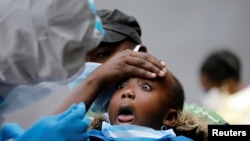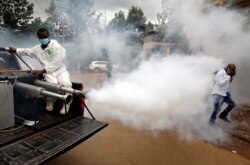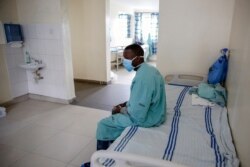Kenya is offering free testing for the coronavirus in densely populated, high-risk areas of Nairobi but the Ministry of Health says that so far, it’s been a low turnout. The testing, which kicked off Friday and continues this week, has uncovered dozens of new positive cases.
On Monday morning, 25-year-old Martin Wakwayika was one of the hundreds in Eastleigh, a neighborhood in Nairobi’s central business district, who turned up at a temporary Ministry of Health stand to get tested for the coronavirus.
Having recorded more than 50 coronavirus cases, Eastleigh is one of the most densely populated neighborhoods in Nairobi that Kenya’s Ministry of Health warned might be a coronavirus hotspot.
The ministry on Friday began mass testing in the targeted areas, with hundreds of residents like Wakweyika volunteering themselves for testing.
“I went to get tested to know if I was OK,” Eastleigh said. “I have two children in the house and I am always out working, so I had to know if I am OK.”
Another hotspot where dozens more positive cases were confirmed in the past week is the neighborhood of Kawangware.
Hundreds queued for testing at a primary school in the area on Monday, but thousands more such as Connie Mwana chose to stay home.
“When you get to those quarantine facilities, the chances of contracting COVID-19 are high, because of the way people are staying in the facilities. For example sanitation is not good, people are sharing washrooms, picking individuals and taking them by force to these quarantine facilities has made people fear," she said.
Mwana said she cannot risk exposing her kids to quarantine if she was to test positive.
She hopes if she has the virus, it may pass as a flu without her noticing.
But thinking like that will allow the virus to spread, said ministry official Rashid Aman at a news conference Sunday.
“The outcome of the testing so far has shown a low turnout in some of these areas. In the last two days, the testing teams have tested 803 against a target of 2,000 in Kawangware, 494 in Eastleigh against a target of 3,000. I want to remind Kenyans that there are countries that people beg to be tested yet their governments are unable to do so. As of now the Ministry of Health has acquired the testing capacity to undertake targeted testing, but the willingness of the people to be tested is low,” he said.
Part of the problem may be that those who are found positive are charged for the tests, and have to send two weeks in quarantine at a government facility.
The cost of quarantine, which is also charged to the patient, is $20 per day, much more than the daily wage of most people in the slum areas where the mass tests are being conducted.
In an effort to encouraging more testing, the Ministry of Health on Monday said the government will cover the fees of patients who show they cannot afford the cost.
On Monday, Kenya recorded 25 new cases of the coronavirus, raising the number of confirmed cases in the country to 490.






